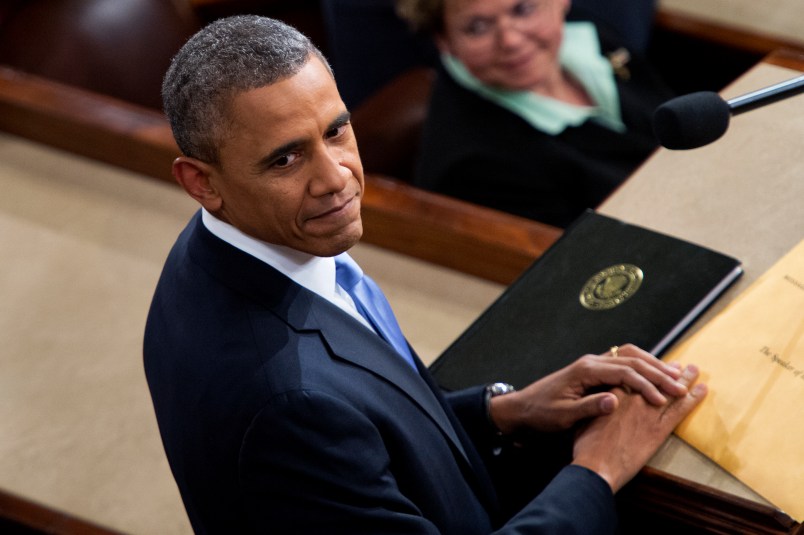It was not unexpected that the Supreme Court took up a case Tuesday challenging the Obama administration’s executive actions on immigration. But it was somewhat of a surprise that in doing so, the court asked to be briefed on whether the memo outlining the administration’s policy “violates the Take Care Clause of the Constitution” — a question which was not addressed directly in lower court decisions and not among those the U.S. government included in its petition.
Its inclusion by the Supreme Court raises the stakes on the suit by opening up the possibility that the court is interested in hearing arguments that the executive action has violated not just administrative protocol or even statutory law, but the Constitution. A ruling by the court on that basis could redefine the parameters of executive power just as Obama is maximizing his use of unilateral action to bypass Congress in the waning days of his presidency.
“It would certainly be quite a surprising and dramatic result to say people can sue the government to say you’re not enforcing the law the way we’d like. That would be a very dramatic change,” Andrew Pincus, a Supreme Court advocate supportive of the administration’s position, told TPM.
Conservatives from Sen. Ted Cruz (R-TX) to Hans von Spakovsky of the Heritage Foundation have celebrated the question’s inclusion. It has the potential to bring “a sweeping decision that strongly limits executive discretion in a host of areas besides immigration enforcement,” von Spakovsky wrote in an op-ed with fellow Heritage expert Andrew Kloster.
“The Supreme Court — if they address it at a constitutional level — will absolutely touch on the extent of executive power, because this president has really pushed executive authority well beyond where other presidents have gone in this area,” Carrie Severino, chief counsel and policy director of the Judicial Crisis Network — a conservative legal organization — told TPM.
But others following the case closely played down its significance.
“It’s a question that was involved in this case,” said Karen Tumlin, the legal director of the National Immigration Law Center, which is supporting government’s position. “It’s quite likely that the Supreme Court wants to be thorough and wants to end what has been a very politicized lawsuit,” she said.
The Take Care Clause provides that the president “shall take Care that the Laws be faithfully executed.” Courts have been reluctant to interpret it, but it has been understood to both give the president the authority to implement laws but also to do so in a way that’s “faithful” to statutes passed by Congress.
However, how the court could approach the question remains mystery to legal experts who study executive power, as little has been said in the courts about what the Take Care Clause means.
“In general courts, don’t like to address enforcement related questions,” said Zachary Price, a professor at University of California Hastings College of the Law who has written about executive discretion. He said that, because of the Take Care clause, enforcement is seen as a “core executive function” and examining enforcement “often involves a very messy inquiry where it is very hard to draw precise lines.”
Discussion of the clause first appeared at the early stage of the immigration case, which is being brought by Texas and 25 other states. The government’s response to the states’ argument the clause was violated has been that “there is no independent cause of action under the Take Care Clause. “
So far, the district court and an appeals court has sided with the states, but neither decision addressed Take Care directly. So Texas brought it up again in its brief opposing a Supreme Court grant of case, arguing that if the court was going to take up the case, it should at least also examine that question.
Ilya Shapiro, a constitutional scholar at the libertarian Cato Institute — which is supporting the states — also discouraged reading too much into the question’s addition.
“I don’t think it’s a sign that’s good for the government or good for the states,” he told TPM.
Just because the Supreme Court requests to be briefed on question doesn’t mean it will necessarily engage in it. It’s also unclear how many justices supported adding the question, since that process happens behind closed doors and they come to the decision informally rather than by a vote count, the Supreme Court clerk’s office told TPM.
“There should be no panic because of the inclusion of the fourth question” said Peter Shane, a professor at The Ohio State University Moritz College of Law, who strongly suspects the idea to add the Take Clause question came from one of the conservative justices. “I would be shocked if you could get Chief Justice Roberts to say that a statutory complaint amounted to a constitutional violation, and I think that of Justice Kennedy, too. I cannot imagine there being fewer than six votes for the president on that.”







“We the Court hereby find that executive orders are bad, and not to be used.”*
*applies only when there is a black LIBRUL in the Whites House
Was gonna say… they must be pretty sure Hillary will win cause this would be a real downer for the next Republican president.
Let’s see: Reagan and Bush both issued far more executive orders than President Obama.
Gee, what is fundamentally different between the former two and the later?
/s/
There seems to be an overwhelming number of issues that our country needs to deal with, from police abuse to climate change; yet conservatives on SCOTUS or in Congress can’t seem to see anything beyond the color of the President’s skin.
After we kick Trump to the curb, where he belongs with the other gutter trash, we’re going to unleash our brand of judicial activism for a few generations, just like conservatives have done. Of course, that will be after we sue every Republican executive for failing to enforce environmental, gun, banking, and civil rights laws.